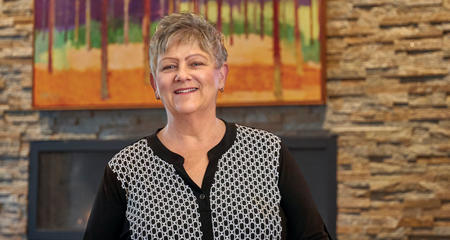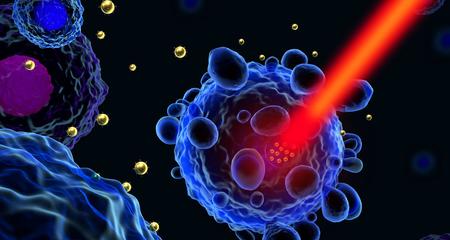All of our lung cancer patients have the full support of our entire team. Follow-up care can continue for years afterward. We also offer comprehensive support services through the Jeffrey C. Siegel Quality of Life Center to help patients during every stage of treatment and recovery.
To ensure the most comprehensive lung cancer care, the Froedtert & the Medical College of Wisconsin Clinical Cancer Center offers a smoking cessation program that focuses on individualized treatment. Each patient receives one-on-one smoking cessation counseling and a personalized quit plan that focuses on practical steps and realistic goals to help patients stop smoking. If needed, patients will also receive smoking cessation medication.
Our pulmonologists continue to follow up with patients for any ongoing pulmonary problems and general pulmonary care. A respiratory therapist sees patients in collaboration with a pulmonologist to assist with treatments.
Appointment Preparation
Lung cancer is a challenging disease and the information can feel overwhelming at times. Bring this list with you to appointments if necessary to help you remember what questions to ask, or make your own list of questions.
- Questions to Ask During the Diagnosis Phase
- Questions to Ask Prior to Treatment
- Questions about Surgery
- Questions about Chemotherapy
- Questions about Radiation Therapy
- Questions about Clinical Trials
- Questions about Managing Symptoms
- Questions to Ask at the End of Treatment
- Other Questions
Questions to Ask During the Diagnosis Phase
- What tests will be done to determine if I have cancer?
- When will the results be available?
- Will I be called with the results, or do I need to make a follow-up appointment?
- Who should I call if I have problems while waiting for my results?
Questions to Ask Prior to Treatment
- What kind of cancer do I have?
- What stage is my cancer?
- Has my cancer spread?
- What are my treatment options?
- What treatments do you recommend?
- Are there any clinical trials testing new treatments for my stage of cancer?
- Are there any costs associated with a clinical trial?
- What are the side effects of the treatments?
- How long will each treatment last?
- Can I still work?
- Will I have to be in the hospital for any of my treatment?
- Will the treatments stop me from doing anything?
- Are there any clinical trials available?
- How will I know if the treatment is effective?
- When will follow-up tests be done to check on the progress of my treatment?
- What if my treatment is ineffective – what is the next step?
- What are the symptoms that should prompt me to call you right away?
- Do you have any materials I can read about my cancer?
- Should I continue to follow-up with the specialists I see for other health problems (diabetes, COPD, congestive heart failure) or will you manage those things as well?
Questions about Surgery
- Am I a good candidate for surgery?
- What kind of surgery can I have?
- How soon will I be able to return to normal activities after surgery?
- Should I undergo chemotherapy or radiation after surgery to make sure all the cancer is destroyed?
Questions about Chemotherapy
- Why are you recommending chemotherapy?
- Is the chemotherapy to get rid of my cancer or make my symptoms better?
- How will you know if the treatment is working?
- If it is not working will you stop the treatment? Or change the treatment?
- How often will I have to come in for treatment?
- Can I have my treatment as an outpatient?
- How long will the course of chemotherapy be?
- What are the side effects?
- Is there anything I can do to reduce the side effects?
- Will I lose my hair?
- Will my hair grow back?
- Can I still work?
- Are there any long-term side effects?
Questions about Radiation Therapy
- Why are you recommending radiation therapy?
- Is the radiation to get rid of my cancer or make my symptoms better?
- How long will the radiation last?
- What are the side effects?
- Is there anything I can do to prevent the side effects?
- How should I take care of my skin?
- Are there any long-term side effects?
- Can I still work?
Questions about Clinical Trials
- What are the possible risks and benefits?
- What are the side effects of the treatment?
- How long will the trial last?
- Will my insurance cover the costs?
- What happens if I have complications from one of the treatments?
Questions about Managing Symptoms
- Will I have pain? If so, how will it be treated?
- Who should I call if my pain is not controlled with the medications I have?
Questions to Ask at the End of Treatment
- What is the risk of my cancer recurring?
- Do I need to follow up with you after my treatment is done? How often?
- Are there any long-term side effects of the treatment that I should know about?
- What kinds of lifestyle changes should I make after I finish my treatment?
Other Questions
- Do you know about any support groups in the area?
Virtual Visits Are Available
Safe and convenient virtual visits by video let you get the care you need via a mobile device, tablet or computer wherever you are. We’ll gather your medical records for you and get our experts’ input so we can offer treatment options without an in-person visit. To schedule a virtual visit, call 1-866-680-0505.
More to Explore





